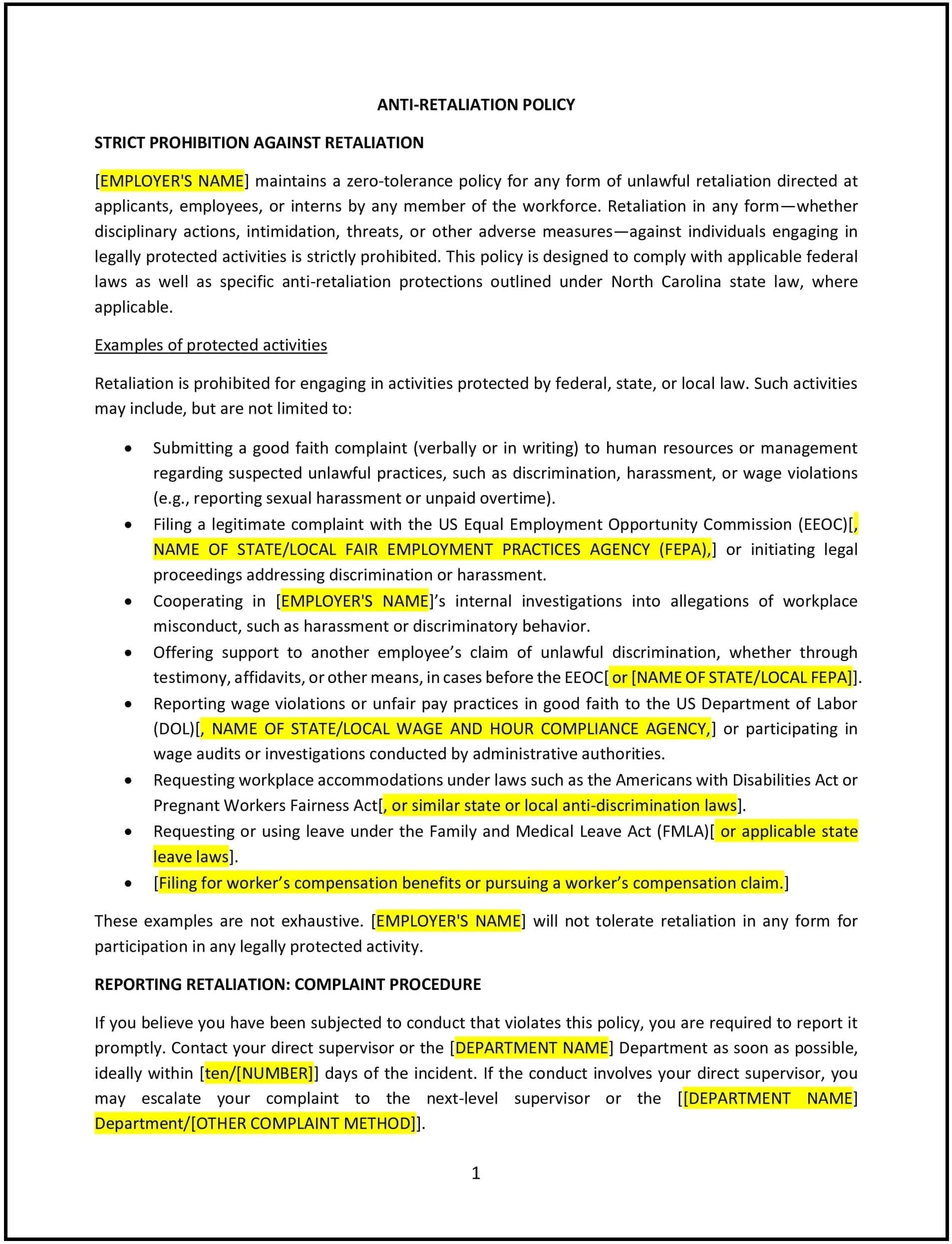Anti-retaliation policy (North Carolina): Free template
Got contracts to review? While you're here for policies, let Cobrief make contract review effortless—start your free review now.

Customize this template for free
Anti-retaliation policy (North Carolina)
An anti-retaliation policy helps North Carolina businesses ensure that employees who report complaints, participate in investigations, or exercise their legal rights are not subject to retaliation or discrimination. The policy outlines the company’s commitment to protecting employees from any adverse action in response to their involvement in protected activities, such as reporting harassment, discrimination, safety concerns, or any other workplace issues.
By adopting this policy, businesses in North Carolina can foster a fair, transparent, and supportive work environment where employees feel safe to raise concerns without fear of retribution.
How to use this anti-retaliation policy (North Carolina)
- Define retaliation: Clearly define what constitutes retaliation, including adverse actions such as demotion, termination, reduced hours, denial of benefits, harassment, or any other action that negatively impacts the employee’s job or work environment.
- Protect whistleblowers: Specify that employees who report misconduct, participate in investigations, or assert their legal rights are protected from retaliation, even if their complaint or participation is not substantiated.
- Set clear reporting procedures: Outline how employees can report retaliation, including how to contact HR or a designated company representative. Provide multiple channels for reporting to ensure that employees feel comfortable raising their concerns.
- Investigate retaliation claims: Define how the business will investigate alleged retaliation, including a thorough and impartial process. Ensure that any findings are addressed appropriately and that the employee’s concerns are taken seriously.
- Ensure confidentiality: Ensure that reports of retaliation are treated confidentially and that the reporting employee’s privacy is respected throughout the investigation process.
- Reflect North Carolina-specific considerations: Address any state-specific laws or regulations regarding retaliation, including protections under North Carolina’s Employment Discrimination Act and other state-level labor laws.
Benefits of using this anti-retaliation policy (North Carolina)
This policy provides several benefits for North Carolina businesses:
- Promotes a safe reporting environment: Employees are more likely to report issues such as discrimination, harassment, or safety concerns when they feel confident that their rights will be protected and that retaliation will not be tolerated.
- Reduces legal risks: By addressing retaliation proactively, businesses can minimize the risk of lawsuits, complaints, or government investigations related to unlawful retaliation.
- Fosters trust and transparency: A strong anti-retaliation policy helps build trust between employees and management, ensuring that employees feel supported and respected when voicing concerns.
- Enhances company reputation: A commitment to non-retaliation strengthens the company’s reputation as a fair and ethical employer, improving relationships with employees and the public.
- Encourages compliance with the law: The policy ensures the business complies with federal and state laws that prohibit retaliation, helping to avoid legal issues.
Tips for using this anti-retaliation policy (North Carolina)
- Communicate the policy clearly: Ensure that all employees understand the anti-retaliation policy, including their rights and how to report any concerns. This information should be part of the employee handbook, and all employees should acknowledge receipt of the policy.
- Provide training: Conduct regular training for managers and employees to raise awareness of retaliation, how to prevent it, and how to handle complaints. Training should cover the company’s commitment to protecting employees from retaliation and the process for reporting concerns.
- Monitor and enforce the policy: Ensure that retaliation claims are promptly addressed and investigated. The company should monitor the workplace environment to ensure that retaliatory behavior is not occurring and take corrective action if needed.
- Foster a culture of openness: Create an environment where employees feel comfortable speaking up about workplace issues without fear of retaliation. Encourage managers to lead by example in fostering an open and supportive workplace culture.
- Review the policy regularly: The policy should be reviewed periodically to ensure it remains in line with North Carolina’s labor laws, any changes to federal regulations, and the evolving needs of the business.